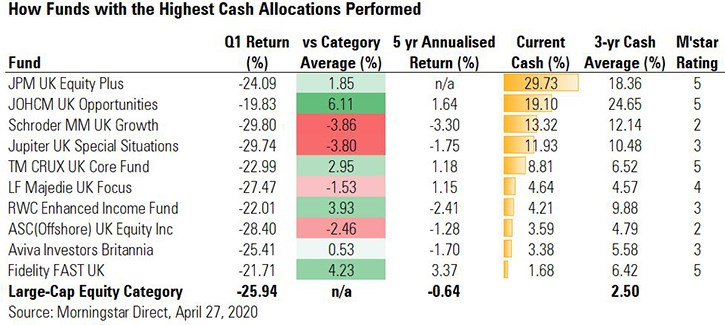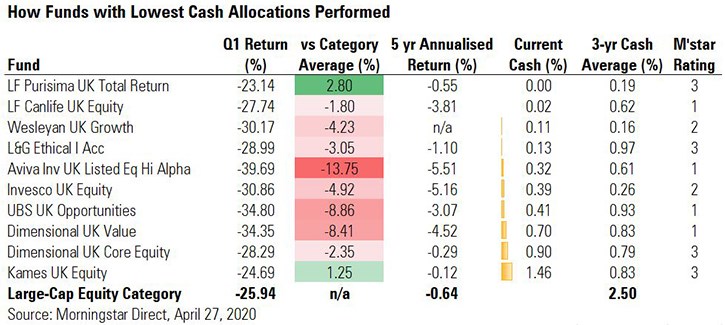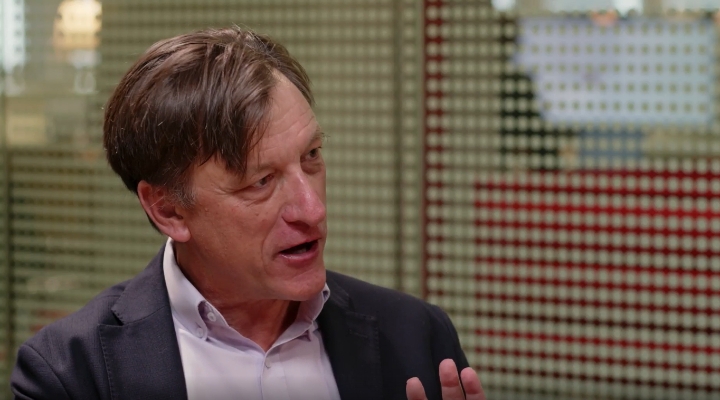
There was little place for investors to hide in the sell-off that defined the first quarter of 2020, as the price of stocks and bonds plunged across the board.
Such was the extent of the stock market turmoil that number-crunching from Moneyfacts reveals cash Isas delivered greater returns than the average stocks and shares Isa in the 2019/2020 tax year. The average investment Isa was down 13.3% in the year, while a cash Isa would have grown your money on average 1.21%.
So, was cash the best place to hide as the stock market moved into bear territory? We have looked at the cash levels of funds in the Morningstar Large Cap Equity category and how well they performed against their peers in the first quarter of the year.
The first table shows the funds which have had the highest average cash positions over a three-year period, according to Morningstar Direct. Here, we also detail their current cash position along with their first quarter return and how this compares to the average return produced by rival funds.

While all of the funds nursed heavy losses in the first quarter of 2020, six of this group have outperformed the average return of their peers. Chief among them is JOHCM UK Opportunities, which was down 19.83% for the quarter, some 6.11 percentage points ahead of the category average. The fund has had the highest cash exposure of the entire category over a three-year period with 24.65% of the portfolio in cash on average over that time. Current cash levels are lower, at around 19% of assets.
Is Cash Drag a Concern?
Fund managers who have a high proportion of their fund in cash are often criticised. If investors wanted their money in cash rather than the stock market, they could put it in a savings account and not pay fund fees, it is argued. Money held in cash rather than invested misses the opportunity to grow and this can lead to so-called cash drag, a dampener on returns. Yet a look at longer-term performance suggests this isn’t a concern. The fund has produced annualised return of 1.64% over five years while many of its peers are in negative territory over that period.
However, it's worth pointing out that the fund's high cash allocation hasn't always made it a top performer. In 2019 the fund ranked in the 95th percentile of its Morningstar Category, but recent performance has seen it shoot up the leaderboard, as we found in our feature which investigated the funds that had gone from zero to hero.
Elsewhere, the JPM UK Equity Plus fund has the highest current allocation to cash, at 29.73% of assets. The fund was down 24.09% in the first three months of the year, 1.85 percentage points ahead of its peer group. The RWC Enhanced Income fund outperformed the group by 3.93 percentage points, albeit with considerably less cash on the books.
Mark Preskett, portfolio manager at Morningstar Investment Management, says: “We definitely saw an increase in the number of managers adding to cash at the start of 2020, driven by the strong run we’d had in equities and bonds. It makes sense that funds with elevated cash levels going into the Covid-19 crisis would, in general outperform those that were fully invested.”
Stock Specific Issues
Of course, holding more cash has not guaranteed outperformance in recent weeks, and stock specific issues have been enough to knock some funds off course. In particular, funds invested in oil stocks or financial businesses have been hit in the latest rout.
Preskett adds: “Jupiter UK Special Siuations and Majedie UK Focus are good examples of this. Both were overweight to miners and financial stocks and both suffered greater losses than the wider stock market.”
Indeed, the Jupiter UK Special Situations fund was down an eye-watering 29.74% in the first quarter, some 3.8 percentage points behind the category average and lagging the FTSE 100, which was down around 25%. The Silver-rated fund, managed by contrarian investor Ben Whitmore, counts banking blue-chips Barclays (BARC) and Standard Chartered (STAN) and oil giant BP (BP.) among its top holdings. It has held an average of 10.48% of its portfolio in cash over the past three years, and delivered an annualised loss of 1.75% over five years.
But if having a higher-than-average cash position hasn’t guaranteed outperformance, then holding less cash than your peers hasn’t guaranteed a fund’s underperformance either. With no cash on the books currently, the Purisima UK Total Return fund has outperformed the category average by 2.8 percentage points in the first quarter, down 23.14% over that period.
The below table shows the performance of the funds with the lowest average cash position over the three years to 2020. Here, eight out of 10 have underperformed the category average. None of the funds in this table have delivered positive annualised returns over a five-year period.

The weakest performer of the group is the Aviva Investors UK Listed Equity High Alpha fund, down a hefty 39.69% in the first three months of the year, lagging its peers by 13.75 percentage points. The fund’s largest position is in oil heavyweight Shell (RDSB), accounting for 8.7% of assets, with commodity giants Anglo American (AAL) and Glencore (GLEN) also featuring in its top 10 holdings.




























